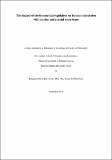| dc.contributor.advisor | Hynes, Stephen | |
| dc.contributor.author | Breen, Benjamin | |
| dc.date.accessioned | 2015-06-25T15:25:35Z | |
| dc.date.issued | 2014-09 | |
| dc.identifier.uri | http://hdl.handle.net/10379/5046 | |
| dc.description.abstract | The primary objective of this thesis is to investigate the impact of environmental regulations on stakeholder interaction with marine and coastal ecosystems as well as provide a thorough treatment of the contrasts in stakeholder and scientific attitudes toward ecosystem management. With respect to stakeholder interaction with marine and coastal ecosystems, the focus is mainly on the behavioural response of fishermen to regulatory changes in fishery policy, but an emphasis is also placed on more diverse stakeholder groups in ecologically important and remote coastal areas, especially as this relates to contrasting ideologies on ecosystem management. The analysis is carried out in three separately framed research papers, each applying separate empirical methodologies.
The first paper considers the impact of changes to species quotas on a fishing fleet's harvesting behaviour in a multi-species fishery by approximating the fleet's objective function using the expected utility hypothesis and portfolio theory. This approach allows the impact of quota changes on the composition of theoretical species harvest portfolios to proxy for the impact of quota changes on fleet's actual retained species catch. The paper contributes to the literature by applying a relatively novel methodology in fisheries research (portfolio theory) to fisheries, using this approach to estimate the impact of quota changes on fleet behaviour. The results indicate that the objective function of the fleets under study were well approximated using the expected utility hypothesis and portfolio theory. Results also suggested that large quota changes lead to significant amounts of displaced effort to be redirected toward the harvest of alternative species in a multi-species fishery, or indeed, in neighbouring fisheries. | en_US |
| dc.rights | Attribution-NonCommercial-NoDerivs 3.0 Ireland | |
| dc.rights.uri | https://creativecommons.org/licenses/by-nc-nd/3.0/ie/ | |
| dc.subject | Behavioural economics | en_US |
| dc.subject | Fisheries | en_US |
| dc.subject | Marine | en_US |
| dc.subject | Coastal | en_US |
| dc.subject | Ecological | en_US |
| dc.subject | Natural resource | en_US |
| dc.subject | Environmental | en_US |
| dc.subject | Cairnes School of Business and Economics | en_US |
| dc.title | The impact of environmental regulation on human interaction with marine and coastal ecosystems | en_US |
| dc.type | Thesis | en_US |
| dc.contributor.funder | Beaufort Marine Research Award | en_US |
| dc.local.note | Assesses changes in fishermen's harvesting behaviour when fishing quotas are increased or decreased for key species. Also considers the differences in value that natural resource stakeholders attribute to local habitat types, as compared with values prescribed by scientists working in professional capacities in environmental management and development. | en_US |
| dc.description.embargo | 2016-05-25 | |
| dc.local.final | Yes | en_US |
| nui.item.downloads | 746 | |


